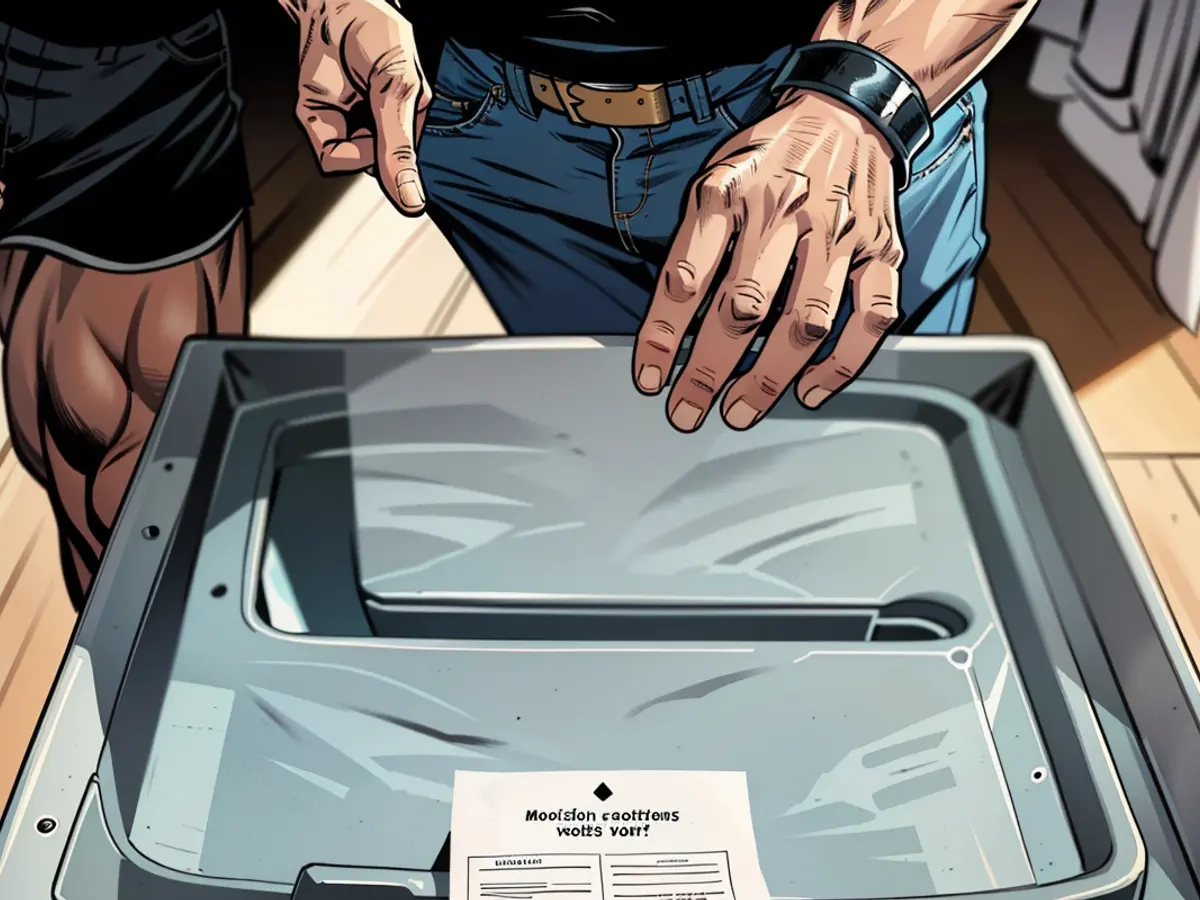Regional governments' electoral contestations - In Thuringia, the AfD holds a clear lead, while the CDU and the AfD are in a tight contest in Saxony.
In Thuringia, the Far-Right Alternative for Germany (AfD) is projected to surge to 30.5 to 33.5 percent (previously 23.4 percent), while the Christian Democratic Union (CDU) settles at 24.5 percent (21.7). The Sahra Wagenknecht's Standing Group (BSW) makes an impressive double-digit debut with 14.5 to 16.0 percent, leaving the Left, led by Minister President Bodo Ramelow, significantly trailing behind, plummeting to 11.5 to 12.5 percent (previously 31.0). The parties of the federal coalition of the traffic light alliance, which are generally losing votes, are in for a challenging evening. The SPD is predicted to drop to 6.5 to 7.0 percent, below its worst result in Thuringia in 2019 (8.2). The Greens and the Free Democratic Party (FDP) fail to secure a spot in the parliament with 4.0 (previously 5.2) and 1.0 to 1.3 percent (previously 5.0) respectively.
In Saxony, the CDU is estimated at 31.5 to 32.0 percent (previously 32.1 percent). The AfD is closely following behind with 30.0 to 31.5 percent (previously 27.5). The BSW debuts with 11.5 to 12.0 percent. The SPD is projected at 7.5 to 8.5 percent (previously 7.7). The Left manages 4.0 to 4.5 percent, barely half of its result five years ago (previously 10.4). The Greens also face concerns with 5.0 to 5.5 percent (previously 8.6). The FDP fails to enter the parliament once more, as in the last two state elections. However, parties falling below five percent can still make it into the Saxony state parliament if they win two direct mandates.
This election outcome is disastrous for the traffic light coalition in Berlin: the result in Thuringia would signify the SPD's worst-ever in a state election since the founding of the Federal Republic. The FDP is not present in either of the two state parliaments. The Greens fail to surpass the five-percent hurdle in both states.
End of the road for the Ramelow government in Thuringia - BSW's critical role
In Thuringia, the previous red-red-green minority coalition under Prime Minister Ramelow (Left), which is reliant on the CDU's cooperation since 2019, has little chance of retaining power. The AfD, classified as a firmly right-wing extremist group by the state constitutional protection agency, will not be included in the new government, as other parties have ruled out collaborations with it.
The most probable coalition scenario, according to projections, would be an unprecedented alliance of the CDU, BSW, and SPD. The BSW, a splinter group from the Left, is expected to hold significant sway. Thuringia's CDU leader Mario Voigt views the projections as a mandate for the Christian Democrats to form the government, as he expressed during election night.
However, especially CDU politicians are troubled by the fact that party leader Wagenknecht was once a member of the East German state party SED and subsequently a leading figure in the communist platform in the Left. Nevertheless, a coalition remains possible, as the CDU's incompatibility resolution prevents it from collaborating with the AfD or the Left - but the BSW is not subject to these restrictions.
Thuringia's AfD leader and top candidate, Björn Höcke, remained unperturbed by the other parties' rejection prior to the election. "We aim to govern," said the 52-year-old, who was previously fined twice for using a Nazi slogan in a first-instance trial.
If the AfD wins more than a third of the seats in the Thuringia and Saxony parliaments, it would secure a so-called blocking minority: decisions and elections requiring a two-thirds majority would need its approval. For example, constitutional judges are elected by parliament with a two-thirds majority.
CDU might continue to coalition with Greens and SPD in Saxony
Saxony has been under a CDU-led government since reunification - since 2019, Minister President Michael Kretschmer has led a coalition with the Greens and SPD. With these initial figures, Kretschmer could continue this coalition. None of the other parties are interested in collaborating with the AfD, which is also considered far-right extremist in Saxony.
Before the election, the Greens accused the CDU and SPD of preparing for a joint minority government. The CDU and SPD in Saxony are well-versed in coalitions with one another, having collaborated three times before.
Polarizing campaign atmosphere
The overall atmosphere during the campaign was tense in both states. Debates were fueled by topics such as Russia's war against Ukraine and Germany's role as Kiev's ally. For instance, BSW chairwoman Wagenknecht said her party would only join a government if it clearly opposed the planned deployment of long-range US missiles in Germany.
The debate surrounding the influx of migrants got even more intense after a tragic stabbing incident in Solingen, claiming the lives of three individuals. Authorities, including the federal prosecutor's office, suspect a Syrian refugee with Islamic ties might be responsible for the attack. Recently, there's been a series of assaults targeting politicians, election aides, and political headquarters in Thuringia and Saxony.
In the context of the discussion about coalition possibilities in Thuringia, it's worth noting that the Landtag rules allow parties falling below five percent to still enter the parliament if they win two direct mandates. This could potentially open up opportunities for smaller parties.
If the AfD manages to gain a majority or a blocking minority in both Thuringia and Saxony parliaments, their approval would be necessary for important decisions and elections requiring a two-thirds majority, such as the election of constitutional judges.








